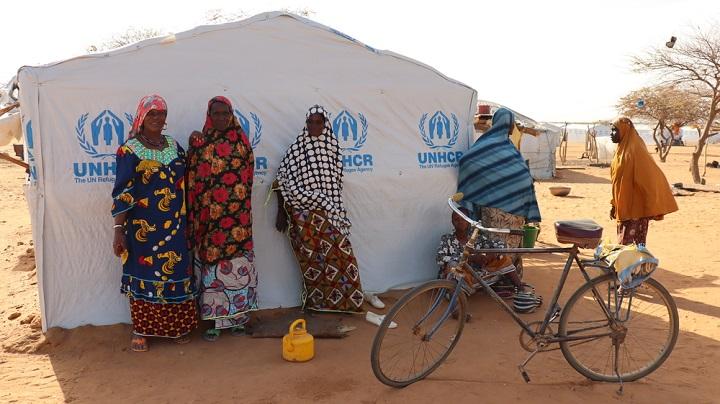"To draw water over a whole day" Brucinafaso, whose water shortage has become severe due to conflict and climate change
The Sahel region in the northern part of Burkina Faso is the hottest desert area in Japan.The climate change for each season is severe, and the lack of water is becoming more severe.In addition, since 2018, it has become a center in armed dispute in the African Sahel area, which spans several countries.In this conflict, many people became refugees and developed into a need for humanity assistance.Climate change overlaps, and people in extremely weak positions are exposed to the risk of illness without clean water.

Lay all living water at a water supply station
Asee Doraogo arrived at a water station several kilometers away from the evacuation tent at 4:00 in the morning.Six hours from there, he dumped 10 water in a 20 -liter water container."I can't get any more because of the lack of water. Because water will not spread to others," Aise says.At this water station in the Gorom -Gorom district, dozens of women like Aisa are waiting for their turns in search of clean water.The evacuees use the water here for all of their lives, such as cooking and housework.You have to wait for a long time, and the place is far from living, so it is hard to fetch water."Some water is sold, but one water storage container costs 100 safe francs (about 20 yen). Everyone is really hard to choose," says Aise.The refugees can not get a regular job, and even if they have a job, they can only make a little money as a day laborer.
Getting worse humanitarian crisis
Since 2018, in the Sahel area spread over the country on the south side of the African Sahara desert, continuous struggle between armed forces and the Brukina government and armed forces continuously.As a result, a serious humanitarian crisis has arisen, with large -scale population movements, as well as refugees from neighboring Niger and Mari.Currently, more than 350,000 people, about one -third of the regional population, have lived evacuation, and 628,000 people need to provide hygiene support.In both conflict and evacuation areas, the use of basic services is a major issue, and the health risks are enormous.Before the conflict, the seasonal changes in the season were severe in the region, and the lack of water was spurred.According to the United Nations, about 92,000 people need assistance in the Gorom -Gorom district.
“No clean water = the beginning of illness”
In the rainy season, which starts in June, it is easy to secure water, but it is dangerous to use it as a dish or drinking water.The shortage of clean water and the overcrowded living environment, which can be infected through water, such as parasitic infections, skin diseases, and diarrhea.For this reason, the provision of safe water and functional hygiene facilities is a major pillar of activities in Burkinafaso in the Doctoral Corps (MSF) without borders."Hundreds of patients will visit the clinic of the support destination every month," said David Munganga, a medical coordinator for MSF.Between January and March 2021, MSF clinics examined more than 1200 children under the age of five for diarrhea.The other day, MSF has developed a new excavation well in the Gorom -Gorom area where more than 20,000 or more evacuees live.It is a well that can supply 1100 liters of water per hour.The team also repaired the other seven excavation wells.In this area, MSF supports two clinics in addition to Gorom -Gorom District Hospital.In addition, for those who have evacuated newly, they distribute hygienic goods kits such as soap, water storage container, and water purification tablet (daily water tablet).Health Pro Motor regularly visits the residence of refugees and teaches about health and hygiene -related issues."In many regions in Sahel and Brucinafaso, the use of water and basic services has become a major issue in many regions in Sahel and Burkina Faso, who is head of MSF in Burkina Faso.What we are doing is to expand our activities and meet the growing medical and humanitarian needs with those who have been hit in conflicts. "
In Burkina Faso, water shortages remain in six regions (Saint -Santor -Nool, Nor, Eastern, Bukuru Du Moon, Santle -Est).MSF is active in four regions to deliver water to those who need it.The amount of water provided by the MSF in 2020 is about 133,934,000 liters, 45 swimming pools for the Olympics.MSF currently provides medical care and humanitarian assistance to local residents and refugees in Burkina Faso.Activities include free general, specialized medical care, collective vaccination, and distribution of relief supplies.In 2020, we provided more than 478,000 medical treatments.
